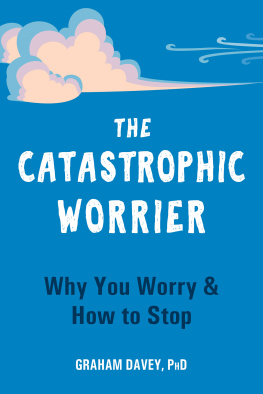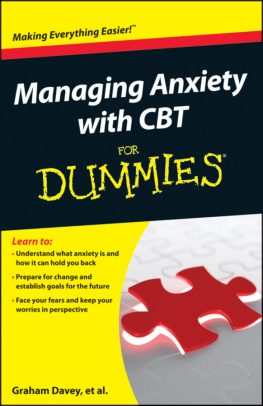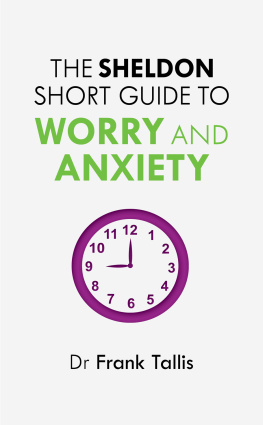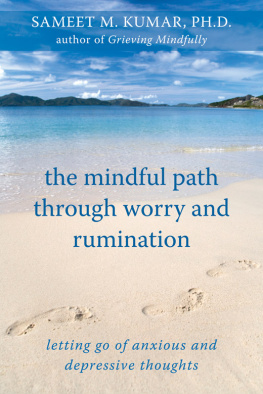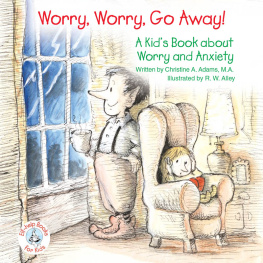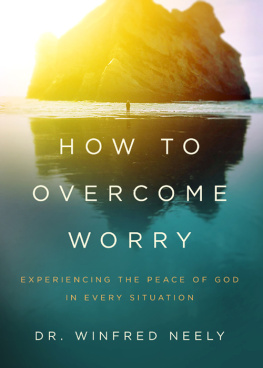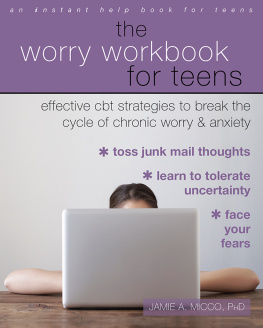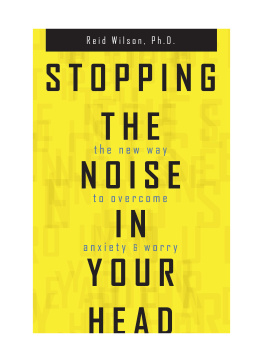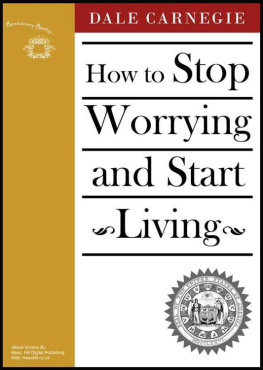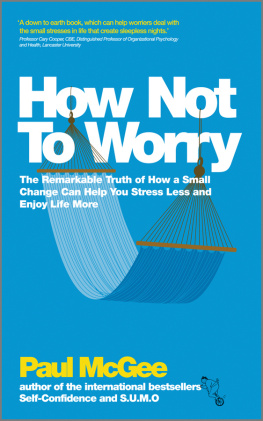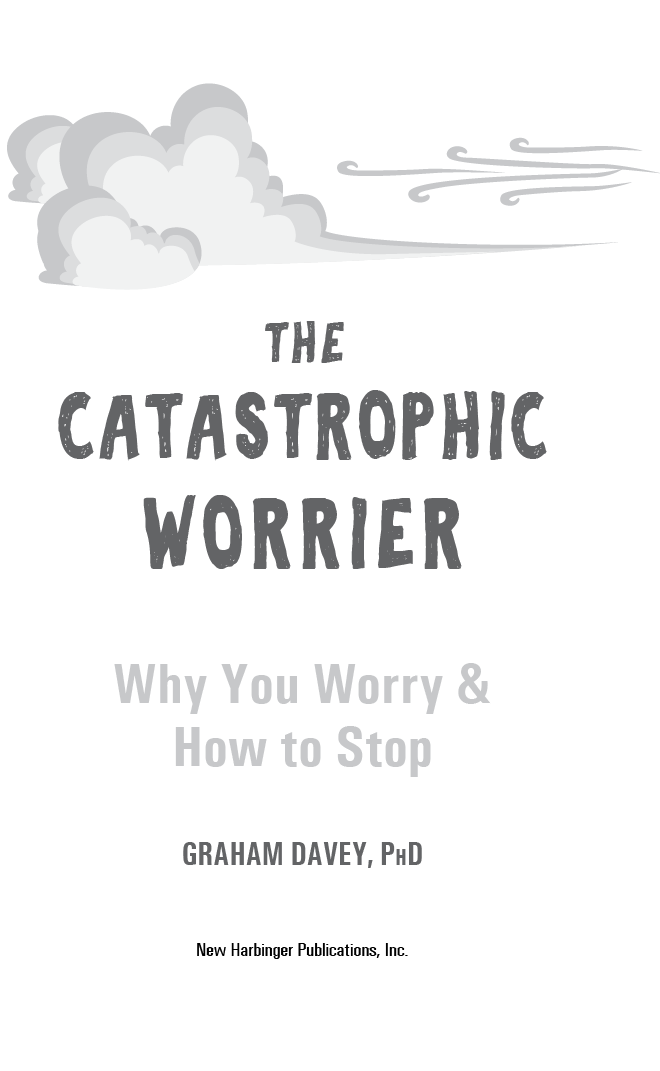Under normal circumstances, worrying is adaptive and motivates us to plan for the future. But for many of us, it can spiral out of control such that we worry incessantly and intensely about even small issues. One word for this process is catastrophizing, and Graham Davey is widely acknowledged as a world expert on this topic. In this well-written, easy-to-read manual, you will learn about the origins and nature of catastrophic worry, and more importantly, youll learn the latest evidence-based strategies for bringing this out-of-control process back under your control.
David H. Barlow, PhD , professor emeritus of psychology and psychiatry at Boston University, founder of the Center for Anxiety & Related Disorders, and author of more than ninety books and clinical manuals on anxiety and emotional disorders
As far as we know, humans are the only species that can anticipate the future and be anxious about what might happen in that future. Worry is commonly focused on things that never happen, and is a cause for considerable distress and ill health. In these times of uncertainty and coming out of COVID lockdowns, worry amongst many of us has increased. It is therefore timely that Graham Davey, a leading psychologist in this area, guides us expertly and gently through the origins and bases of worry, and how we can work on ourselves to minimize its impact. This will be immensely helpful for those who find their minds spiraling off into all kinds of worries.
Paul Gilbert, PhD, FBPsS, OBE , professor of clinical psychology at the university of Derby, and visiting professor at the university of Queensland; president of The Compassionate Mind Foundation; and author of The Compassionate Mind
Are you a worrywart? Are you consumed by worries about your future, your health, and even minor matters? Then you might be dealing with catastrophic worrying. Graham Daveys book will gently guide you through the process of overcoming catastrophic worrying. Written by one of the foremost experts on this topic, this book will help you stop the worry machine and get your life back.
Stefan G. Hofmann, PhD , Alexander von Humboldt professor, and author of CBT for Social Anxiety
Davey has spent thirty years conducting innovative research on worry and anxiety. In this unique book, he draws on his own exacting studies and that of other key researchers in considering why we worry, what makes us vulnerable to excessive worrying, and what to do about it. This is a valuable resource for professionals in the field, and sufferers seeking a deeper understanding and associated exercises to transform catastrophic worry into smart worry.
Adrian Wells, PhD , professor of clinical and experimental psychopathology at The University of Manchester, UK; and director of the Anxiety, Depression and Psychological Therapies Research Unit at Greater Manchester Mental Health NHS Trust
Graham Davey summarizes decades of research on worry and anxiety into a practical, accessible, and engaging book that explains why we worry, why we keep worrying, and importantly, how we can reduce our worrying. Readers are guided through evidence-supported strategies and exercises that work, and that will help them to live more fulfilling lives. A must-read for all talented worriers.
Peter McEvoy , professor of clinical psychology at Curtin University, senior clinical psychologist at the Centre for Clinical Interventions, and associate editor of the Journal of Anxiety Disorders
The Catastrophic Worrier is a delightfully accessible book, written by an internationally recognized expert who has researched worry for many years. Topics include the causes of worry, and practical steps the reader can take to become a more adaptive worrier. Addressed to readers who are burdened by worry that has become uncontrollable and distressing, it will also interest psychology students, mental health professionals, and anyone interested in how the mind works.
Richard Bentall , professor of clinical psychology at the University of Sheffield, fellow of the British Academy, and author of Madness Explained
Publishers Note
This publication is designed to provide accurate and authoritative information in regard to the subject matter covered. It is sold with the understanding that the publisher is not engaged in rendering psychological, financial, legal, or other professional services. If expert assistance or counseling is needed, the services of a competent professional should be sought.
NEW HARBINGER PUBLICATIONS is a registered trademark of New Harbinger Publications, Inc.
New Harbinger Publications is an employee-owned company.
Copyright 2023 by Graham Davey
New Harbinger Publications, Inc.
5674 Shattuck Avenue
Oakland, CA 94609
www.newharbinger.com
All Rights Reserved
Cover design by Sara Christian
Acquired by Jennye Garibaldi
Edited by Gretel Hakanson
Library of Congress Cataloging-in-Publication Data
Names: Davey, Graham, author.
Title: The catastrophic worrier : why you worry & how to stop / by Graham Davey.
Description: Oakland, CA : New Harbinger Publications, [2023] | Includes bibliographical references.
Identifiers: LCCN 2022032705 | ISBN 9781648480348 (trade paperback)
Subjects: LCSH: Worry. | Anxiety. | BISAC: SELF-HELP / Anxieties & Phobias | SELF-HELP / Self-Management / Stress Management
Classification: LCC BF575.W8 D38 2023 | DDC 152.4/6--dc23/eng/20220914
LC record available at https://lccn.loc.gov/2022032705
For my mother, Betty, and my daughters, Kate and Lizzie.
Contents
Introduction
Worrying is one of the most common human activitiesyet studies claim that 90 percent of what we worry about never actually happens. So why do we do it?
Worry signals that theres something threatening or challenging on the horizon, and we need to deal with it. But do we resolve these problems in our head? Usually far from it. For many of us, worrying rarely offers the comforting solutions to our problems that were looking for. Instead, it simply becomes a search for even more problems that we believe might be hidden in the situation were worrying about. This is known as catastrophic worrying and is the central topic of this book.
Catastrophic worrying can be characterized by that repeated What if? question you ask yourself. You resolutely begin worrying by trying to find a solution thatll resolve your worry, but you end up in a mess after having made the worry seem significantly worse than it was at the start, and you feel considerably more anxious and distressed than when you originally identified the problem. To add to this, everything seems completely out of your controlyou cant stop worrying, the catastrophic outcomes of your worry seem ever more likely to happen the more you think about them, and your worrys grown from a molehill into a mountain.
Uncontrolled catastrophic worrying affects your mental health and your physical health. It interferes with your daily living, your work performance, your family life, and your relationships. It keeps you awake at night and distracts you during the day. So, Ill ask you again: Why do you do it?
At this point, you might want to interrupt and tell me youre a born worrier. However, in this book, Ill argue that the born worrier is a myth. You become a worrier, and if youve learned to be a worrier, then you can also unlearn that tendency.
In this book, Ill describe more than thirty years of research that has helped us understand why we worry, the developmental processes that turn us into worriers, and why worrying so regularly goes wrong and turns into a compulsive, distressing, and uncontrollable activity. But we do have solutions for chronic worrying, and throughout the book, I also describe simple exercises you can use to assess your own worrying, manage some bad worry habits, and finally develop some skills that will turn you into a smart worrier who can solve problems and implement solutions. (Additional materials are available for download at the website for this book at http://www.newharbinger.com/50348.) You can then say good-bye to being a lifelong slave to the distress and confusion that is catastrophic worrying.

